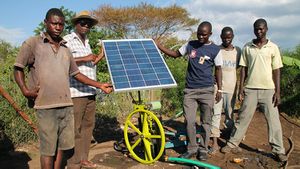Sunflower Pump: Asset-Financed Solar Irrigation Pumps for Smallholder Farmers
Overview
|
Innovator |
||
|
Project |
Sunflower Pump: Asset-Financed Solar Irrigation Pumps for Smallholder Farmers | |
|
Collaborators |
Equity Bank (Kenya) | |
|
Location Applied |
The growing capacity of many smallholder farmers is limited by their ability to irrigate. The limitation may be labor, in the case of manual irrigation, or the costs of purchasing and paying for fuel to run engine pumps. Women and children take on much of the work required to pump or carry water for irrigation. Restricted access to finance is a key constraint for smallholder farmers, particularly for female farmers. Women make up 50 percent of Kenya’s agricultural workforce.[1]
Clean Energy Solution
The Sunflower pump is an easy-to-maintain solar irrigation pump, built around a simple piston pump arrangement. Futurepump has made the product cheaper and will offer it on finance, in order to lower the upfront barriers to solar technology.[1]
Impact
Productivity can be doubled through the use of irrigation water that doesn’t rely on engine pumps. The growing season can be extended through the dry season, during which produce brings a high market prices. Small vegetable farm profits can be increased as much as 45 percent through the use of a solar pump, while reducing their reliance on fossil fuel. All of these benefits will have a major impact on women, particularly because of the reduction in labor burden that mechanization will bring.[1]
Organization
Futurepump represents the commercial arm of a partnership that has spent the past ten years developing and perfecting the Sunflower solar irrigation pump. Futurepump is partnering with Kenya’s Equity Bank to make the Sunflower product available to customers through consumer financing that will lower the barrier to entry.[1]
Progress Update
Futurepump has shipped over 400 SF1 solar pumps from their factory in India to Kenya to date, and increased direct sales to customers utilizing innovative financing plans. They have utilized more detailed monitoring and evaluation techniques to identify that customers of the SF1 solar pump are expected to save $100-$200 a year from reduced fuel and labor costs. In addition to labor savings and reliable energy, many customers use the additional income or monetary savings to pay school fees for their children or grandchildren. One of Futurepump’s lead farmers, Joshua Okundi, explained that these fees can be around $1,500 (150,000 KES) a year and having a reliable income is essential to being able to meet this cost.[1]
Further Information
- Powering Agriculture Portal on energypedia
- Powering Agriculture Homepage, Winners/ Innovators
- Powering Agriculture: An Energy Grand Challenge for Development
- Powering Agriculture Newsletters
- Kenya Energy Situation
- Website Futurepump




















